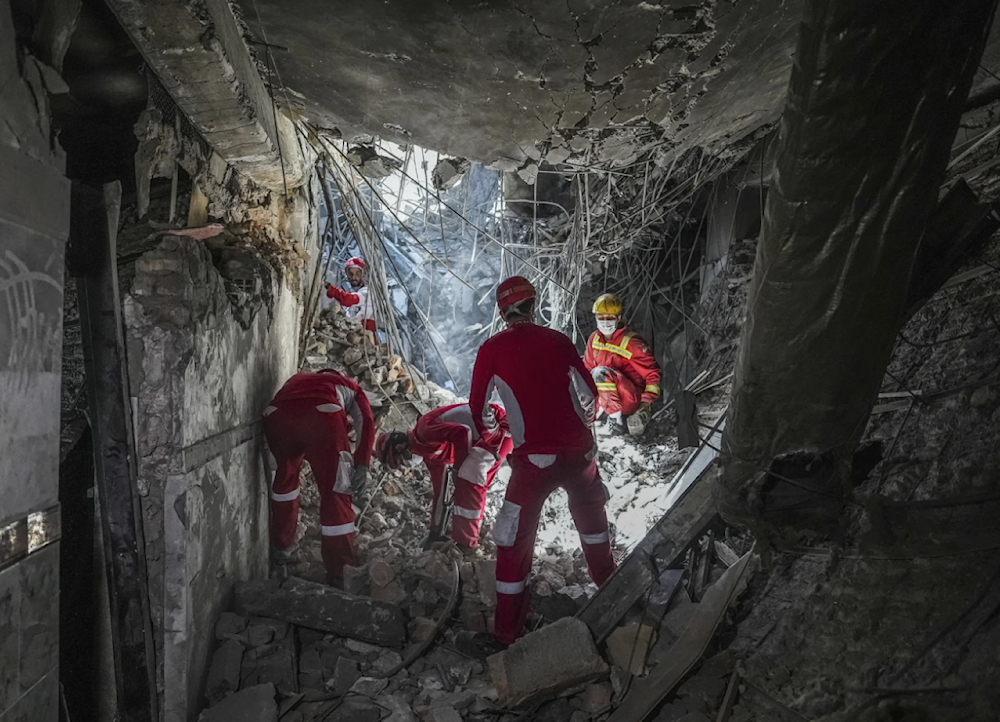Israeli aggression on Iran killed 935, including 38 children
Among the martyrs are 102 women, some of whom were pregnant.
-

Rescuers search through the rubble of a damaged section of the Evin Prison following an Israeli strike the day before in Tehran, Iran, on June 24, 2025 (AP)
The death toll from the 12-day war launched by "Israel" against Iran has risen to 935, including dozens of women and children, according to Iranian Judiciary Spokesperson Asghar Jahangir.
Speaking on Monday, Jahangir cited official figures from the Forensic Medicine Organization, stating that the victims include 38 children and 102 women, some of whom were pregnant.
The war began on June 13, when "Israel" initiated unprovoked strikes on Iran, targeting nuclear sites, military infrastructure, and residential areas and killing several senior military commanders, scientists, and hundreds of civilians. In response, Iran launched a large-scale retaliatory campaign, striking military and industrial targets in Israeli-occupied territories.
Jahangir also criticized Western nations and human rights organizations for remaining silent on "Israel’s" atrocities, calling the attack a “strategic and historical mistake” by "Israel" and warning that it will face serious consequences.
30 students, 7 teachers killed in aggression
Iranian Education Minister Alreza Kazemi said at least 30 students and 7 teachers were martyred in the Israeli 12-day aggression.
He added that measures have been taken in his Ministry to protect the lives of students and teachers at times of war, explaining that "14 committees have been established and contingency scenarios for special circumstances have been developed."
Ceasefire goes into effect
After 12 days of aggression, Iran emerged victorious from "Israel's" war after "Israel" scrambled for a ceasefire, which came into effect on June 24, 2025, at 7:00 am (local time).
Tehran's continued retaliations against the Israeli entity had put severe strain on "Israel's" deterrence capabilities, particularly as interceptor numbers dwindled and Iran scored increasing, strategic hits.
US President Donald Trump announced the ceasefire at midnight Monday, just hours after Iran launched a missile strike on the US air base in Qatar in retaliation for the US attack on Iran's nuclear sites.
Commenting on Trump's remarks, Iranian Foreign Minister Abbas Araghchi said Tehran had no intention of continuing the war if "Israel" halted its illegal attacks on the Iranian people.
'Israel's' war objectives turned into failures in Iran: Exclusive
“Israel” has failed to meet any of the strategic objectives it declared at the start of its aggression against the Islamic Republic, Iranian government spokesperson Fatemeh Mohajerani told Al Mayadeen.
In a written statement provided exclusively to Al Mayadeen, Mohajerani outlined Tehran’s view of the war, the country’s deterrence capabilities, and the future of Iran’s nuclear program in the face of international pressure.
She stated that "Israel's" initial war goals ultimately turned into "military, security, and diplomatic failures," adding that "Iran’s national resolve to preserve independence, sovereignty, and internal security has only grown stronger."
"The Zionist regime made a strategic miscalculation," Mohajerani said, stressing that it “paid the price for its error.” She dismissed Israeli claims of having destroyed Iranian defense capabilities, labeling such statements as "messages for domestic consumption aimed at calming the Zionist public."
Delving into the Islamic Republic's defense capabilities, Mohajerani emphasized that Iran’s military posture is based on deep, layered, and self-reliant capabilities, noting that what unfolded on the battlefield proved Iran’s readiness to launch both symmetrical and asymmetrical responses. “Our retaliation against Israel was decisive, legitimate, and effective in deterrence,” she stressed.

 3 Min Read
3 Min Read









